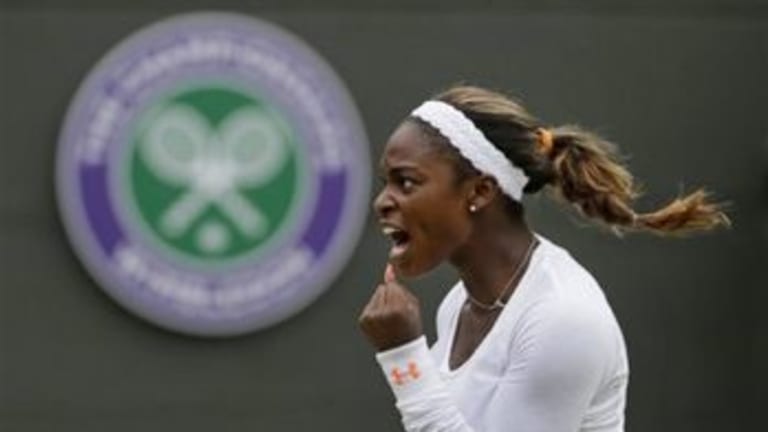WIMBLEDON, England—Marion Bartoli made one fundamental mistake in her 6-4, 7-5 win over Sloane Stephens in the quarterfinals on Tuesday. At 4-5 in the first set she tried to stop play because it had begun, very lightly, to rain. Anywhere else, this may have been understandable, but apparently not in Great Britain. Here rain is the default weather setting, after all. Bartoli’s insistence—she complained not just to the chair umpire, but to the referee at the back of the court—was enough to earn her the wrath of the No.1 Court 1 crowd for the rest of the match. By wrath, of course, I mean Wimbledon-style wrath. The frenzied Frenchwoman was modestly booed on a few occasions, and when she double-faulted, perhaps a third of the crowd clapped.
But this vicious display of partisanship wasn’t enough to keep Bartoli from reaching her second Wimbledon semifinal.
“Honestly, it didn’t matter much to me,” she said later. “They want to see some more tennis. It’s normal for them to cheer for the underdog, and I feel I did pretty well with that.”
As Bartoli reminded us, distractions have always been the name of her game.
“I’ve been really much prepared for everything,” she said, referring to the eccentric training methods of her father, who has also been her coach for most of her life. “Especially my childhood and the way my dad made me practice, the condition I had to practice in was really the toughest in the world. He has always been my strength to really be able to focus mentally and stay strong no matter what is happening.”
Ironically, Bartoli has made this run without her father, Walter, who has been the one enduring presence on the sidelines during her career. The two have been an on-again, off-again team lately, and she has experimented with other coaches; she’s here with 2006 Wimbledon champion Amelie Mauresmo in her corner. But Bartoli, at 28, knows her own game by now, and she knows that her flat shots and the ultra-acute angles she creates with her roundhouse strokes are well-suited to grass. In 2007, she beat Justine Henin to reach the final here, and two years ago she knocked out Serena Williams in the fourth round.
“Every time, for some reason, I don’t know why, I’m back here [at Wimbledon] I have a smile on my face” said Bartoli, who pulled out of Eastbourne last week with a virus. “I felt great right away.”
She has played irreproachable tennis during the fortnight so far. With some help from the draw—she was scheduled to play Maria Sharapova in the fourth round—Bartoli has reached the semifinals without dropping a set. Today she showed what those flat angles can do again, as she had Stephens on the move for most of the day. She attacked Sloane’s backhand relentlessly, and jumped on her serve. In the second set, Bartoli won 17 of the first 18 points on Stephens’ serve.
“For some reason,” Bartoli said, “I felt really good on my return the second part and not on my serve. The return of serve has been a strength.”
There were 10 breaks in the match, but Bartoli said she thought that, "for a grass-court match, it was a good one.” And she went on to praise the 20-year-old Stephens, who was playing in just her second Wimbledon.
“I really thought she played some amazing shots,” Bartoli said of Sloane. “I think for someone who’s 19 [Stephens turned 20 in March], she’s doing an awesome job out there....It could also have been her day. She could have beat me today, as well.”
